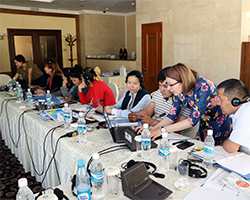Kyrgyzstan media workshop: advancing reporting skills on tobacco and NCDs

WHO/Almaz Zhumaliev
Acknowledging that the media are an important partner in building public awareness, the WHO Country Office in Kyrgyzstan brought together more than 20 local journalists and press officers from the government, including the Ministry of Health, and health organizations for a 2-day workshop, to strengthen their capacity to report on tobacco-related issues, including noncommunicable diseases (NCDs). The workshop took place on 12–13 June 2018 in Bishkek, Kyrgyzstan.
Participants deepened their knowledge about the health implications of tobacco use and also how tobacco is more than a health issue and can spur stories about environment, economics, human rights and illicit trade. They were briefed on the role of the WHO Framework Convention on Tobacco Control (WHO FCTC) in Kyrgyzstan, improved their professional reporting and story-writing skills, and reinforced theoretical and practical knowledge to report accurately and effectively on tobacco-related issues.
Journalists were also given an introduction to WHO data sources, and how to use these data to make their stories stronger, and to communicate health-related numbers and facts in simple language. WHO open data sources allow journalists to make necessary analytical assessments and to present the outstanding data in the context of their stories.
“I found this media workshop extremely useful due to its uniqueness. Being a journalist requires access to the latest statistics and the professional skills to present these data to your readers. In this training, I have discovered many useful things. For example, I know now how and where to search WHO statistics, figures and key publications, and how best to present statistics and facts about tobacco,” said one of the participating journalists.
Joint efforts to reach sound tobacco control
Journalists can play a unique and vital role in raising awareness about the dangers of smoking. They play a particularly important role in Kyrgyzstan due to fact that 1 in every 2 men smoke in the country. The workshop served as an entry point for the WHO Country Office in Kyrgyzstan to strengthen its position in the country’s media landscape. This will enable WHO to activate local journalists to raise other health issues in order to prompt action that will protect the health of individuals, families and communities in Kyrgyzstan.
The overall objectives of the training were:
- to strengthen the capacity of journalists in reporting on NCDs and related topics, particularly on tobacco control;
- to facilitate the process of finding reliable resources for journalists to use in writing stories;
- to assist journalists in preparing to report on tobacco control in a professional and ethical way;
- to introduce the latest WHO findings and data on tobacco control.
The workshop was supported by technical assistance and funding from WHO in accordance with the Biennial Collaborative Agreement for 2018–2019 between the Ministry of Health of Kyrgyzstan and WHO, and from the Bill & Melinda Gates Foundation strategic grant to WHO.



